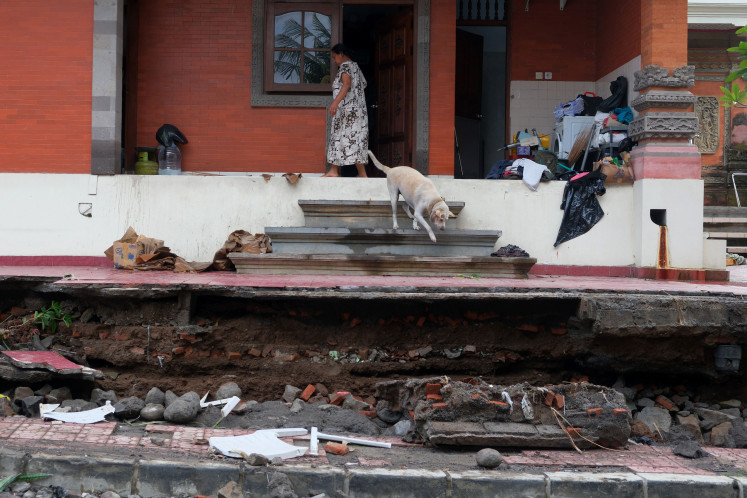Popular Reads
Top Results
Can't find what you're looking for?
View all search resultsPopular Reads
Top Results
Can't find what you're looking for?
View all search resultsJokowi should apologize to RI's indigenous peoples: AMAN
President-elect Joko âJokowiâ Widodo should immediately follow up on the United Nationsâ (UN) endorsement on the protection of the rights of indigenous peoples, as it is in line with his âpro-peopleâ approach, according to a human rights campaigner at a two-day UN conference in New York
Change text size
Gift Premium Articles
to Anyone
P
resident-elect Joko 'Jokowi' Widodo should immediately follow up on the United Nations' (UN) endorsement on the protection of the rights of indigenous peoples, as it is in line with his 'pro-people' approach, according to a human rights campaigner at a two-day UN conference in New York.
Abdon Nababan, secretary-general of the Indigenous Peoples' Alliance of the Archipelago (AMAN), said Jokowi needed to apologize to [Indonesia's] indigenous people and promise to address their problems. 'Such a gesture would restore people's confidence and trust and it wouldn't cost a penny,' he said on the sidelines of the conference on Tuesday.
Jokowi has shown a strong interest in gross violations of human rights, which has been reflected by the work carried out by his transition team in gathering information and input on the issue from civil society groups.
According to Abdon, Jokowi, who will succeed President Susilo Bambang Yudhoyono on Oct. 20, should first talk directly with those people who have suffered state abuses for decades.
He added that an intensive approach toward indigenous groups was necessary as they played a pivotal role in preserving the environment in general and forests in particular.
The UN recently hosted the two-day world conference on indigenous peoples, which was opened Monday by UN Secretary-General Ban Ki-moon. The conference issued an Outcome Document, which clearly outlined the need for UN member states to end the massive suffering of indigenous peoples from exploitation and oppression at the hands of their own governments and private companies.
Addressing the conference as Asia's representative during the closing session, Abdon said the global climate-change crisis had provided the momentum for indigenous peoples to convince the world that they were a key part of the solution to global warming.
'Violence has often been used by the state to silence dissent. At the heart of the crisis, basic corruption and abuse of power has happened in the process of forest and land grabs, notably in the process of obtaining permits for forest conversions. It is all caused by human greed,' Abdon said.
- AMAN secretary-general says such a gesture would restore people's confidence, trust
- After 2-day conference, UN issues clear call for end to suffering of indigenous peoples at the hands of govts, companies
He acknowledged that to a certain extent, the Yudhoyono government had tried to provide greater protection for indigenous peoples. The Constitutional Court, in a historic ruling last year, mandated the government to 'return the status of indigenous peoples as an inseparable part of their indigenous ancestral areas'.
'The ruling provided a fundamental correction, which has significantly affected Indonesia's overall legal framework and agrarian policies,' he continued.
The UN conference focused on several issues, including the land and rights belonging to indigenous peoples. It recognized 'that the traditional knowledge, innovations and practices of indigenous peoples and local communities make an important contribution to the conservation and sustainable use of biodiversity.'
More than 1,000 activists attended the global conference. The presence of Bolivian President Evo Morales at the conference was a particular highlight, as he is the first indigenous leader of a country on the American continent. As president, Morales has implemented a number of measures to restore full rights to Bolivia's indigenous population on natural resources and government control.
Speaking at the conference, Morales pointed to capitalism as the greatest threat to indigenous movements around the world.
'The fundamental principles of the indigenous movement are life, mother earth and peace and these principles of the worldwide indigenous movement are permanently threatened by a system and model, the capitalist system; a model that extinguishes human life and mother earth,' he stated.










